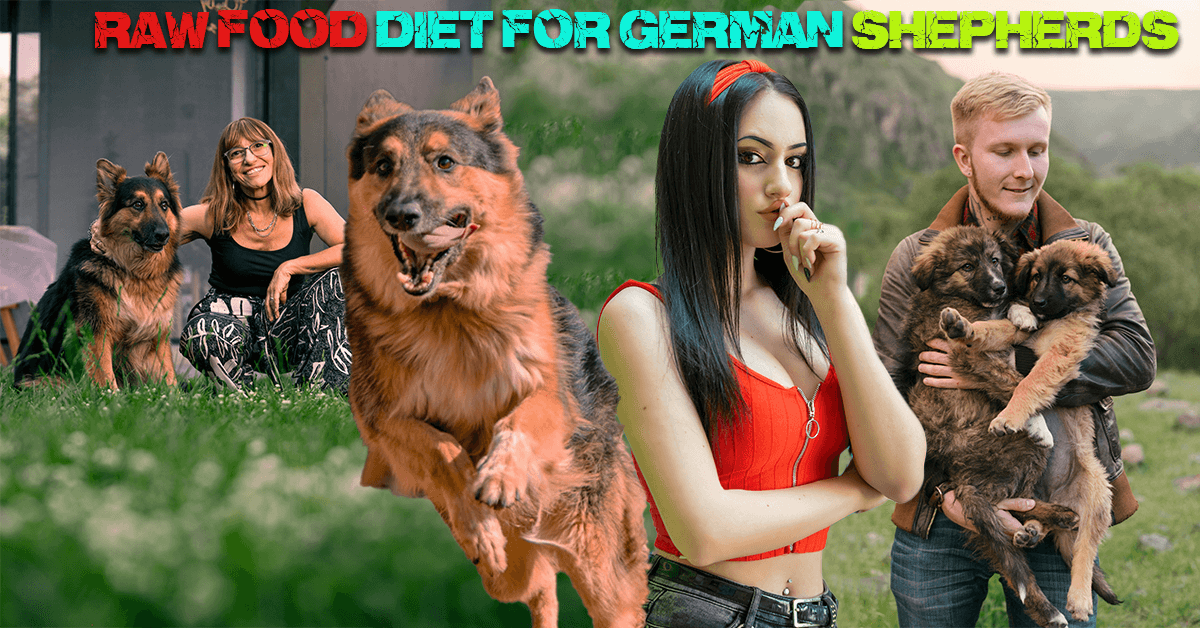A Raw Food Diet for German Shepherds health and digestion. This diet often includes raw meat, bones, fruits, and vegetables.
Embracing a raw food diet for your German Shepherd Dog (GSD) can be a transformative step in managing their nutrition. Known for their active and robust nature, GSDs require a nutrient-rich diet to maintain health and vitality. A raw food regimen, often called a BARF diet (Biologically Appropriate Raw Food or Bones and Raw Food), aligns closely with their ancestral eating habits.
It typically involves a variety of raw meats, bones for calcium, organ meats for essential vitamins, and a selection of fruits and vegetables to provide the necessary fiber and nutrients. Owners opting for this diet report improvements in their dogs’ coats, energy levels, and overall well-being. Before transitioning your GSD to raw food, it’s crucial to consult with a veterinarian to ensure a balanced diet that meets all of their nutritional needs.
Introduction To Raw Food Diets For Dogs
An Introduction to Raw Food Diets for Dogs opens the door to a world where canine nutrition returns to nature. This approach feeds dogs the food they would naturally eat in the wild. Raw diets often contain muscle meat, bones, fruits, and vegetables.
Origins Of Biologically Appropriate Raw Food (barf)
Biologically Appropriate Raw Food (BARF) came to life in the late 20th century. Australian vet Ian Billinghurst proposed this diet. He believed that adult dogs would thrive on an evolutionary diet based on what canines ate before they were domesticated. Billinghurst’s acronym, BARF, stands for both ‘Biologically Appropriate Raw Food’ and ‘Bones and Raw Food’.
Rising Popularity Among German Shepherd Owners
German Shepherd owners are increasingly turning to raw diets. These dogs often excel on a BARF diet. Owners report better health outcomes, such as shinier coats, healthier skin, and improved energy levels. Raw food diets for German Shepherds are gaining fans for their natural approach to nutrition.

Benefits Of Raw Food Diet for German Shepherds
German Shepherds thrive on diets that mirror their ancestral eating habits. Raw food diets are gaining popularity among dog owners for their potential health benefits. Let’s explore how raw feeding can be a game-changer for your German Shepherd’s well-being.
Enhanced Nutritional Intake
Raw diets for German Shepherds are rich in essential nutrients. These diets contain fresh meats, bones, and organs. German Shepherds benefit from the high protein content and lack of fillers in commercial dog foods. Vitamins, minerals, and enzymes in raw food are in their natural state, making them easier for dogs to absorb.
Improved Digestive Function
A raw diet includes a balance of meat and fibrous vegetables. This combination aids in smooth digestion for German Shepherds. Their digestive systems are shorter and more acidic, perfect for separating raw food. Owners often notice less stool volume and odor when their dogs eat raw food. This indicates a more efficient digestive process.
Healthier Skin And Coat
Natural fats and oils in a raw diet contribute to a shiny coat and healthy skin. German shepherds can suffer from skin allergies from processed foods. A raw diet can lead to fewer allergic reactions and less shedding. Essential fatty acids in raw meals promote a smooth, glossy coat and reduce itchy, flaky skin.
Key Components Of A Balanced Raw Diet
Exploring the key components of a balanced raw diet for German Shepherd Dogs is essential. This diet emphasizes natural foods, aiming to mimic a dog’s ancestral eating habits. Understanding the various components can ensure your pet gets all the nutrients for optimal health.
Animal Proteins And Organ Meats
Animal proteins and organ meats form the foundation of a raw diet for German Shepherds. These include:
- Beef
- Chicken
- Lamb
- Kidneys
- Livers
These meats provide essential proteins and fats. They support muscle development and energy levels.
Bones For Dental Health And Calcium
Bones are crucial for dental health and provide calcium. They help in:
- Cleaning teeth
- Strengthening bones
Use raw, soft bones like chicken necks or lamb ribs to avoid choking.
Fruits And Vegetables For Fiber And Vitamins
Fruits and vegetables add fiber and vitamins to your dog’s diet. Include:
- Carrots
- Apples (without seeds)
- Spinach
- Blueberries
These help in digestion and boost the immune system.
Transitioning Your German Shepherd To Raw Food
Transitioning Your German Shepherd to Raw Food can be a beneficial choice for their health. A raw diet can improve energy, healthier skin, and a shinier coat. Before making the switch, it’s essential to understand how to transition your canine friend properly.
Gradual Introduction Of Raw Ingredients
Begin by mixing small amounts of raw food with your dog’s current diet. Gradually increase the raw portion over several weeks. This slow process will help your dog’s digestive system adjust.
- Start with 10% raw food in the first week.
- Increase to 20% in the second week.
- Continue adding 10% more each week.
Use high-quality proteins like chicken, beef, or lamb. Add raw bones for calcium and teeth cleaning.
Monitoring Your Dog’s Response To Diet Changes
Watch your dog closely as you switch foods. Look for signs of improved health or any discomfort.
| Positive Signs | Warning Signs |
|---|---|
| More energy | Upset stomach |
| Shiny coat | Weight loss or gain |
| Firm stools | Behavior changes |
Keep a daily log of your dog’s behavior, appetite, and stool quality. If issues arise, adjust the diet or consult a vet.
Portion Sizes And Feeding Frequency
Finding balance in your German Shepherd’s raw food diet is key. This balance helps maintain their energy levels and supports their health. Let’s dive into how much raw food to serve and when to feed your loyal companion.
Calculating The Right Amount Of Food
The right portion size is crucial to keep your German Shepherd in top shape. Factors like age, weight, and activity level play a part. A common guideline is daily 2-3% of your dog’s ideal weight. Puppies may need up to 10% to fuel their growth.
Here’s a simple breakdown:
- Adult Dogs: 2-3% of body weight
- Puppies: Up to 10% of body weight, spread over multiple meals
- Active or Working Dogs May require additional food
Keep an eye on your dog’s weight and adjust portions as needed. A lean physique is ideal for German Shepherds.
Ideal Feeding Schedule For Optimal Health
A regular feeding schedule helps your dog digest and utilize nutrients efficiently. German Shepherds thrive on routine. Dogs who are adults fare well on two meals a day. Puppies, however, need more frequent meals.
Consider this schedule:
| Age | Feeding Frequency |
|---|---|
| 8-12 weeks | 4 meals a day |
| 3-6 months | 3 meals a day |
| 6-12 months | 2 meals a day |
| Adults | 2 meals a day |
Sticking to this schedule can help prevent bloating and ensure your dog gets the energy it needs throughout the day. Always provide fresh water, especially when feeding a raw diet.
Credit: www.youtube.com
Safety Concerns And Myths Debunked
German Shepherd owners often consider a
diet for their canine companions. It promises natural nutrition akin to what ancestral wolves might have eaten. Yet, safety concerns arise alongside prevalent myths. This section addresses common worries and misconceptions, ensuring owners can make informed decisions.
Addressing Bacterial Risks
Raw diets can expose dogs to bacteria such as Salmonella and E. coli. Proper handling and hygiene are key to mitigating these risks. Below are steps to maintain a safe raw food regimen:
- Source high-quality, fresh ingredients from trusted suppliers.
- Store raw food at the correct temperatures to prevent bacterial growth.
- Clean all surfaces and utensils after preparing raw meals.
- Regular vet checks ensure your German Shepherd stays healthy.
Common Misconceptions About Raw Diets
Myths about raw diets for dogs are widespread. Let’s debunk a few:
| Myth | Fact |
|---|---|
| Raw diets are unbalanced | With careful planning, raw diets can be complete and balanced. |
| Raw food is too hard to digest | Many dogs digest raw food easily due to their predatory nature. |
| Raw bones are dangerous | Appropriate raw bones can be safe and beneficial for dental health. |
Remember, every dog is unique. Consult a vet who understands raw diets to tailor the best plan for your German Shepherd.
Supplements To Enhance A Raw Food Regimen
Many German Shepherd owners embrace a raw food diet for their canine companions. This diet mimics a dog’s natural eating habits. Yet, sometimes, a raw diet alone may not meet all nutritional needs. Supplements can fill these gaps, ensuring dogs thrive.
When To Consider Adding Supplements
Dogs on a raw food diet often get plenty of protein and fat, but they might lack certain vitamins and minerals. Signs that your German Shepherd might need supplements include a dull coat, lethargy, or joint stiffness. A vet can confirm these needs with a blood test.
Recommended Supplements For Joint And Bone Health
Hip and joint problems are common in German Shepherds.
Supplements can support bone strength and joint flexibility. This is crucial for their active lifestyle.
| Supplement | Benefits | Dosage (Consult Vet) |
|---|---|---|
| Glucosamine | Supports joint health | Varies |
| Chondroitin | Enhances cartilage integrity | Varies |
| Omega-3 Fatty Acids | Reduces inflammation | Varies |
| Vitamin D | Essential for bone health | Varies |
| Calcium | Strengthens bones | Varies |
Start with a balanced diet. Add supplements if needed. Your German Shepherd will thank you with wagging tails and happy, healthy years ahead.
Real-life Success Stories
Many owners see great benefits from a raw food diet for their German Shepherds. These stories show how this diet has improved their dogs’ health and vitality.
Case Studies Of Improved Health
Several studies highlight the positive effects of a raw food diet on German Shepherds:
- Increased energy levels and better stamina
- Shinier coats and healthier skin
- Better dental health, with cleaner teeth and fresher breath
- Improved digestive function, with less bloating and gas
One notable case involved a five-year-old German Shepherd named Max. Max’s allergies disappeared after switching to raw food, and his energy soared.
Testimonials From German Shepherd Owners
Owners of German Shepherds who switched to a raw diet often share their positive experiences:
| Owner’s Name | Dog’s Name | Improvements Noted |
|---|---|---|
| Sarah | Bella | Better coat, more energy |
| John | Rex | Less joint pain, improved agility |
| Emily | Luke | Weight management, better mood |
These stories help other owners see the potential benefits of a raw diet.
Creating A Custom Raw Diet Plan
Creating a Custom Raw Diet Plan for your German Shepherd is a step towards ensuring its health and vitality. Tailoring the diet to the dog’s needs can lead to a happier and more energetic companion. Let’s explore creating a plan that’s just right for your furry friend.
Consulting With A Canine Nutritionist
Getting professional advice is key. A canine nutritionist can provide valuable insights. They will direct you in the proper direction.
They know what works best for German Shepherds. They may assist you in putting together a healthy, well-balanced eating plan.
Adjusting The Diet To Your Dog’s Specific Needs
Every dog is unique. Age, activity level, and health conditions matter. The raw diet plan must consider these factors. Adjustments may be necessary over time. Keep an eye on your dog’s health and adjust as needed. This ensures they always get what they need.
| Life Stage | Protein | Fats | Carbs | Vitamins | Minerals |
|---|---|---|---|---|---|
| Puppy | High | Moderate | Low | Essential | Required |
| Adult | Moderate | Low to Moderate | Low | Essential | Required |
| Senior | Low to Moderate | Low | Low | Essential | Required |
- Protein sources like lean meats are a must.
- Healthy fats from oils and meats support energy.
- Carbs from vegetables aid in digestion.
- Minerals and vitamins are essential for good general health.
Monitor your dog’s weight and health. As necessary, adjust the diet plan.
Always keep it balanced and complete. Your German Shepherd will thank you with their boundless energy and joy!
Faqs: Raw Food Diet For German Shepherds
German Shepherds, known for their loyalty and intelligence, thrive on a balanced diet. Dog owners increasingly adopt the raw food diet, often known as BARF (Biologically Appropriate Raw Food or Bones and Raw Food).
Below are expert answers to frequently asked questions by German Shepherd owners considering a raw food diet for their pets.
Addressing Common Questions
- Is a raw diet safe for my German Shepherd? Yes, with careful planning and proper hygiene.
- What are the benefits? Improved coat, healthier teeth, and higher energy levels.
- Can puppies eat raw food? Yes, but their diet needs are different from adult dogs.
Expert Answers To Owner Concerns
| Concern | Expert Answer |
|---|---|
| Balanced Diet | Include muscle meat, bones, organs, and eggs for balance. |
| Portion Size | Feed 2-3% of their body weight daily, split into two meals. |
| Food Transition | Start by mixing raw food with their current diet, then gradually increase. |
Best raw food diet for German shepherds
A raw food diet for German Shepherds can be highly beneficial, emphasizing natural, unprocessed ingredients to enhance their health and vitality. The best raw food diet should include a balanced mix of muscle meat, organ meat, bones, and a small portion of fruits and vegetables.
Muscle meat provides essential proteins, while organ meats like liver and kidneys offer vital vitamins and minerals. Bones are crucial for calcium and phosphorus, aiding in dental health and bone strength. Additionally, incorporating vegetables such as spinach, carrots, and broccoli ensures a supply of fiber, antioxidants, and essential nutrients.
Including supplements like fish oil can enhance omega-3 fatty acid intake, promoting a healthy coat and skin. It’s essential to source high-quality, human-grade ingredients and consult with a veterinarian to tailor the diet to the specific needs of the German Shepherd, ensuring all nutritional requirements are met for optimal health.
Frequently Asked Questions
Is Raw Food Good For German Shepherds?
Raw food can benefit German Shepherds if properly balanced and safely handled, providing a diet close to their natural eating habits. Before altering your dog’s food, always get advice from a veterinarian.
What’s The Best Diet For A German Shepherd?
The best diet for a German Shepherd includes high-quality, protein-rich foods with balanced fats and carbohydrates. Opt for whole meats, healthy grains, and essential nutrients to support their active lifestyle and joint health. For tailored nutrition guidance, always visit a veterinarian.
Should I Feed My German Shepherd Raw Eggs?
Feeding your German Shepherd raw eggs is generally safe but should be done cautiously. Only offer clean, fresh eggs, and potential risks like salmonella should be considered. Consult your vet for personalized advice.
What Vegetables Can German Shepherds Not Eat?
Due to toxicity risks, German Shepherds should avoid onions, garlic, avocado, grapes, raisins, and raw or green potatoes.
Conclusion
Embarking on a raw food journey with your German Shepherd can unlock numerous health benefits. Tailoring their diet to mimic ancestral eating patterns may bolster vitality and wellness. Remember to consult with your vet to ensure a balanced, safe nutritional path for your furry companion.
Embrace the natural goodness and watch your German Shepherd thrive.

I’m a Canada, UAE, US, and UK-based writer and dog expert blogger. I spent over five years learning about dog food and grooming techniques. Additionally, I recommend avoiding and properly treating various physical problems in dogs. I am here to share my knowledge about good dog nutrition and care.

